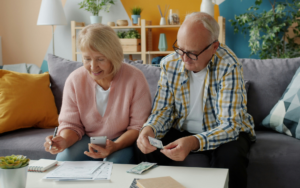Some people genuinely enjoy tracking their spending. They carefully categorise expenses, balance the numbers, and colour-code everything in a spreadsheet. And then there’s the rest of us. Maybe you’ve tried budgeting before, and it felt restrictive and time-consuming. Maybe it didn’t stick and that’s okay.
Here’s the thing: you don’t necessarily need a budget to be good with money. You can still save, still feel on top of things, and still plan for the future without ever opening a spreadsheet or managing every single dollar you spend. It’s just a matter of picking an approach (or a combination of approaches!) that works for you.

Pay yourself first and separate your savings
The first thing you should do is move your money before you even see it. This simple shift can make a surprisingly big difference. Set up an automatic transfer right after payday so a portion of your income goes directly into a savings account. Don’t overthink the amount. It doesn’t have to be large or ambitious. Even a small, consistent transfer builds over time. What matters is that it happens first, before your brain has a chance to decide it needs that money for something else.
You can even take it a step further by keeping your savings in a separate bank account that’s harder to access. No debit card. No app that shows your balance every time you open it. The more friction between you and your savings, the more likely it is to stick around.
Clear the path of temptation
Once your savings is in motion, work out what’s pulling you into spending money unnecessarily. The sale emails, the apps you open when you’re bored, the brands that pop up when you’re trying not to shop. These tiny nudges are more powerful than they seem.
You don’t need to delete everything or cut yourself off completely, but even unsubscribing from a few promotional emails or hiding shopping apps in a folder you rarely open can create just enough space to think twice. When you’re not constantly being invited to spend, you’re far less likely to do it on autopilot.
Try a soft delay instead of a hard no
That extra space you’ve created helps with impulse spending too. Not by banning every fun purchase, but by adding a small pause. Try giving yourself a 24-hour buffer before buying anything over a certain amount. It gives you time to decide if you actually want or need the item or if it just caught you at the right (or wrong) moment. This gentle pause often results in walking away from things that seemed urgent but weren’t.
Let saving feel good
As your balance starts to look a little healthier, saving can even become satisfying. Not in a charts-and-goals kind of way, but in the quiet moments of progress. Maybe it’s a day where you don’t spend anything and feel oddly proud. Or maybe it’s realising you didn’t make any impulse purchases this week and still felt fine.
Try turning this into a habit by choosing one day a week to avoid all non-essential spending. Call it whatever you like. It’s not about being strict or punishing yourself. It’s about pressing pause, resetting your habits, and noticing how little effort it can take to save when you give yourself a break from the constant flow of spending.
These small changes tend to build on each other, even if you’re not consciously tracking them.
Use tools that save without asking
Some of the best saving happens without effort. Many banks and apps now offer round-up features that add a few cents to your savings every time you make a purchase. Buy a $5.20 coffee, and 80 cents goes into your savings account automatically. It’s like a digital jar where your spare change quietly collects, without requiring you to do anything.
Cash to help save
If you like having some limits but don’t want to track every detail, try using cash for small, everyday spending. Withdraw a set amount each week for things like coffee, snacks, or takeout. When it’s gone, it’s gone. You’re still free to enjoy your day-to-day treats, but now there’s a built-in stopping point.
None of this is traditional budgeting. But it works. And the best part? You didn’t have to give up your coffee or your peace of mind to get there. You just gave your money a chance to grow.


